Lotte-rPET – Eco-packaging 25-08-2022 - Arhive
Lotte-rPET – Eco-packaging
Crude Oil Prices Trend
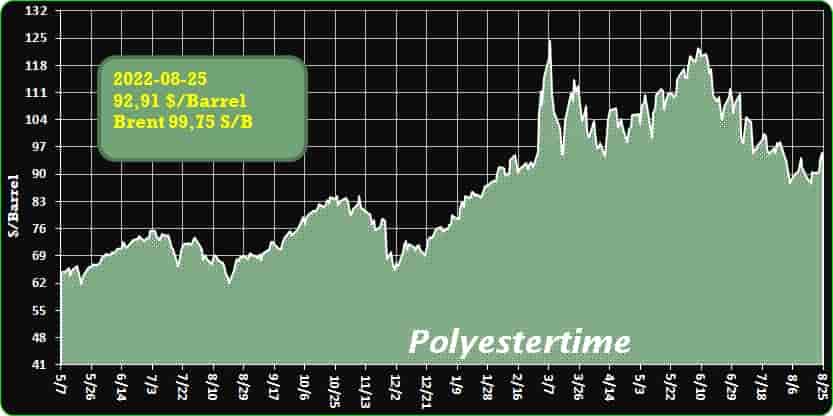
-Alpla expanding its manufacturing technology for OTC Packaging
The market for over-the-counter (OTC) pharma products has developed rapidly in recent years. The ALPLA Group’s pharma packaging division ALPLApharma is responding to this by expanding its manufacturing technology for OTC bottles with the addition of flexible extrusion blow moulding (EBM), which makes sustainable and customer-specific packaging solutions possible in this area.
Following a strong growth phase, demand for over-the-counter pharmaceuticals and food supplements has been very volatile over the past two years. There was also a decline in the sale of, for example, cold and flu remedies as a result of the coronavirus pandemic and the global measures implemented to contain it (contact restrictions, mandatory face coverings, reduced mobility). At the same time, vitamins and drugs that boost immune defence enjoyed a sharp upswing. The market for OTC products is forecast to remain on the growth path seen in recent years, but with the sales channels increasingly shifting in the direction of mail order business. At the same time, SME vendors are also entering the market with new and innovative products.
Sustainable and weight-optimised containers
ALPLApharma has recognised this market potential and is expanding its OTC container production capacities. In addition to the injection blow moulding (IBM) technology the company has been using until now, it will henceforth also offer its customers EBM technology in its production activities. This is a standard technology at the ALPLA sites around the world and the company has decades of proven expertise in this field. ‘The market for OTC containers is becoming more and more important for us. In the USA in particular, what’s known as the pill container market is now huge. At the same time, the customers’ requirements regarding sustainable, weight-reduced and cost-effective containers have increased around the world, which is why we are expanding both our technological and commercial scope with EBM and are in a position to cater to a wider array of requests,’ says Walter Knes, ALPLA Managing Director ALPLApharma.
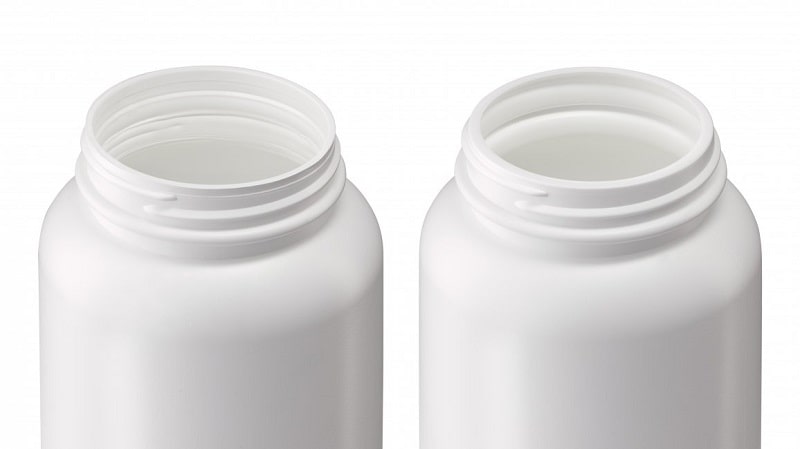
-UPM Raflatac embraces 360 degree sustainability approach for Labelexpo and beyond
UPM Raflatac, a global supplier of innovative and sustainable labeling materials, will take its company-wide 360°sustainability approach one step further at Labelexpo Americas by calculating their event participation footprint, minimizing waste and offsetting CO2 emissions in collaboration with event management company Tapaus.
“We take a 360°sustainability approach to our business by applying the principles of reduce, recycle, renew, and reuse through responsible sourcing, sustainable operations and logistics, all the way to innovative products and services. Having the opportunity to partner with Tapaus for Labelexpo allows us to identify the potential climate impact of our booth at the event and then compensate for the booth’s carbon footprint,” stated Ashley Drew, Sustainability Manager, UPM Raflatac, Americas.
As part of their climate calculations, Tapaus factors in the climate impacts of transports, structures, tech, catering, and waste. Tapaus then offsets the carbon footprint through high-quality climate compensation projects with reliable certifications delivered by the Tricorona company. Project examples include increasing solar and wind energy, planting trees and water filtration.
In addition, UPM Raflatac is participating in a waste management initiative organized by TLMI and Convergen Energy in partnership with Labelexpo Americas. This initiative aims to save printed materials at Labelexpo from landfill. During the expo, UPM Raflatac will be delivering waste such as label stock, paper and film release liners, and matrix waste to show organizers. Convergen will collect this waste and process it to create fuel pellets, which are used as a substitute for coal.
At UPM Raflatac’s booth 515, attendees will be able to see the company’s latest innovations including the Ocean Action Label and UPM Raflatac OptiCut™ DT Linerless. The company will display many of its sustainable solutions, such as UPM Raflatac Forest Film™, PP PCR and UPM Raflatac RAFNXT+ products certified as CarbonNeutral®*
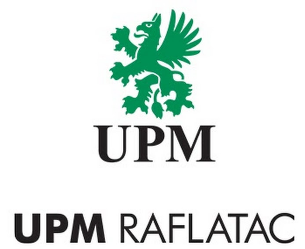
-Lotte Chemical launchs pilot production of chemically recycled polyethylene terephthalate
Lotte Chemical, a major chemical company based in South Korea, has launched the pilot production of chemically recycled polyethylene terephthalate (PET) as part of efforts to covert its PET production plant into an outpost for chemical recycling that breaks down and returns plastic to its pure, raw material form.
It is an attractive way to address the explosive growth of plastic waste and disposal problems. polyethylene terephthalate (PET) is the most common thermoplastic polymer resin used in the creation of fabrics and plastic bottles. Researchers and companies have tried to develop technologies for recycling PET bottles to use them as raw materials for new eco-friendly products.
At its production base in the southeastern industrial city of Ulsan, Lotte Chemical will invest about 100 billion won ($74 million) to build a new plant that can handle waste PET to produce some 45,000 tons of bis(2-hydroxyethyl terephthalate (BhET), an intermediate in the production of polyethylene terephthalate.
The company would build a production facility by 2024 that will use recycled materials to produce chemical recycled PET (C-rPET). “Through this C-rPET pilot production, we have laid the foundation for converting the Ulsan plant into a green factory,” Lotte Chemical’s basic material business head Hwang Jin-koo said in a statement on August 23. By 2030, the entire process of producing 340,000 tons of PET in Ulsan will be converted to C-rPET.
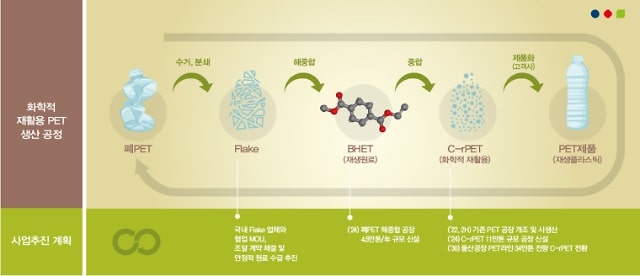
-Al Ahram Beverages injects EGP 5m in PET Recycling for 2022 in partnership with DORNA
Al Ahram Beverages Company announced its partnership with “DORNA” to achieve the company’s sustainability target of recycling 25% of its plastic PET production by the end of 2022, by working with informal waste recyclers in targeted areas. This partnership comes under the auspices of the Ministry of Environment. Al Ahram Beverages Company is investing EGP …
Al Ahram Beverages Company announced its partnership with “DORNA” to achieve the company’s sustainability target of recycling 25% of its plastic PET production by the end of 2022, by working with informal waste recyclers in targeted areas. This partnership comes under the auspices of the Ministry of Environment.
Al Ahram Beverages Company is investing EGP 5m for the current year to achieve this target, and will accordingly increase investments each year to achieve recycling 100% of its PET production by the end of 2025.
Al Ahram Beverages and DORNA in their first steps towards real recycling that integrates with the informal recycling workers in Egypt towards a Green future – free from plastic PET wastes which threaten our environment and our lives. What goes around, comes around.
Al Ahram Beverages Company (ABC) is the oldest operating beverages company in Egypt, and one of the leading companies in sustainability in the country under its global strategy “Brewing A Better World”.
In 2021, ABC initiated and signed the ‘Plastic Pact’ with the Ministry of Environment to confirm its sustainability and responsibility commitments towards the environment and society and invested EGP 5m in “DORNA” to support the recycling system and the whole informal value chain to reach 25% of its plastic PET by end of 2022. The current year is the first step in the Al Ahram Beverages Company and “DORNA” partnership to slope up until reaching 100% in 2025, then continuing the company’s first financial investment towards its plastic neutrality in Egypt.
“DORNA” is a reverse credit system designed by CID Consulting that serves as the first socially inclusive model for Extended Producer Responsibility (EPR) in Egypt. It is a scalable and sustainable industry-wide solution for plastic neutrality that engages with informal waste recyclers to increase their current recycling and recovery rates of PET plastic whilst simultaneously improving their livelihood on more than one front.
-Basf and Nippon Paint China jointly launch innovative industrial eco-packaging in China
- Pioneering application of water based Joncryl® HPB dispersions in construction materials packaging, making “Paper Replacing Plastics” a reality in industrial packaging
- Reduction of thousands of tons of plastics and enabling the reuse of nearly 10,000 tons of paper bags each year
- Building a sustainable and green value chain in China’s industrial packaging market
BASF and Nippon Paint China, the leading coatings manufacturer, jointly launched an eco-friendly industrial packaging, which has been adopted by the Nippon Paint dry-mixed mortar series products. With BASF’s water-based acrylic dispersion Joncryl® High-Performance Barrier (HPB) as the barrier material, the new packaging material is commercialized for the construction dry mortar products of Nippon Paint. It is the first time BASF’s water-based barrier coatings will be used in industrial packaging in China.
With excellent vapor and water resistance properties, Joncryl® HPB, can replace plastics used in traditional packaging and significantly improve the recyclability of paper-based packaging, achieving innovative application of “Paper Replacing Plastics” in industrial packaging.
Its use in Nippon Paint dry-mixed mortar series products is expected to save thousands of tons of plastics and reuse nearly 10,000 tons of paper bags each year, helping to save forests, land, water, electricity, and other resources, reduce carbon emissions and achieve a circular economy and sustainable development of the packaging industry.
“Sustainability and innovation have always been our core strategies,” said Carol Jiang, Business Management Director, Resins for Printing & Packaging, BASF in Asia Pacific. “At BASF, we are committed to providing sustainable solutions to our customers to help them reduce carbon footprint, utilize resources efficiently, and help the industry fulfill its sustainability commitments. This cooperation with Nippon Paint is another innovation in the industrial packaging segment, marking our joint effort in leading the industry development, promoting a circular economy, and creating a better life.”
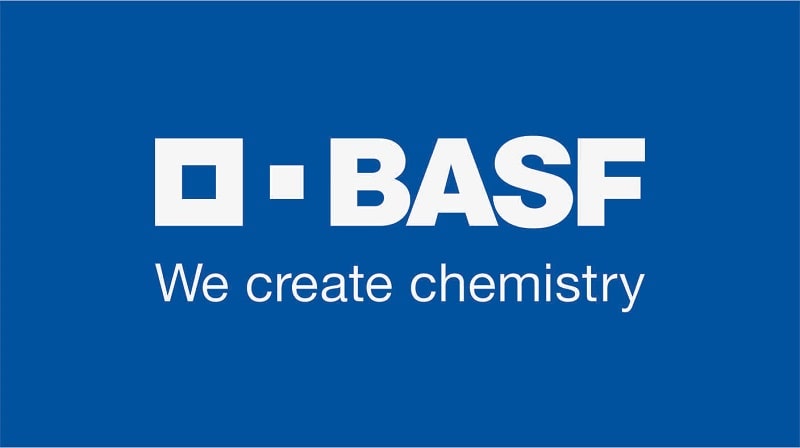
-Tetra Pak highlights “new milestones” in annual sustainability report
Tetra Pak has published its annual Sustainability Report, which highlights that it invested €40 million to advance carton collection and recycling.
Tetra Pak, the Swedish-Swiss multinational food packaging and processing company, says its 23rd Sustainability Report highlights the company’s achievements and ongoing initiatives to protect food, people, and the planet.
The report says that Tetra Pak have reduced operational GHG emissions by 36%, with 80% of energy coming from renewable sources, doubling the solar energy capacity to 5.55MW. It also highlights how the company has invested €40 million to support the collection and recycling of 50 billion cartons, contributing to a circular economy.
Also amongst the achievements in the report was how 61 million children in 41 countries received milk or other nutritious beverages in Tetra Pak packages through school feeding programmes.
The cost of inaction on sustainability today is a world we won’t recognise tomorrow.
In the report, Tetra Pak committed to halve food waste, water consumption and carbon footprint of its best practice processing lines by 2030. The report also highlighted that the company had sold 17.6 billion plant-based packages and 10.8 billion plant-based caps, it says this equates to 96 kilo tonnes of CO2 saved compared to fossil-based plastic.
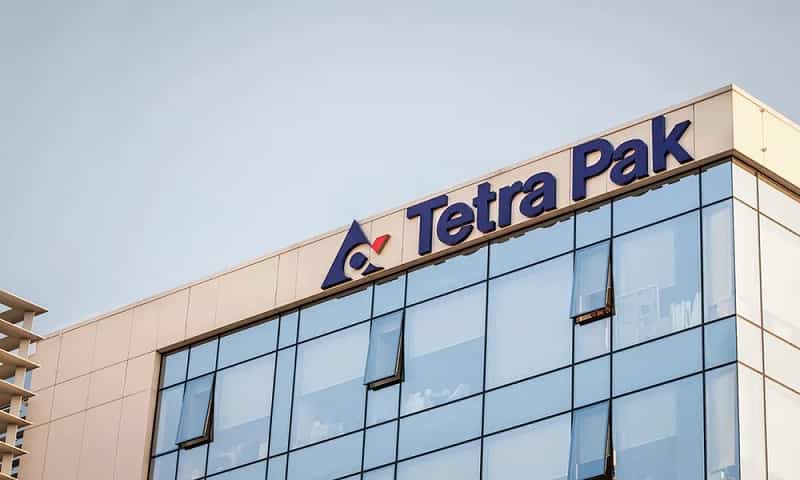
-SK Geo Centric and SABIC make new investment to boost polyolefin elastomer production
A joint venture between SK Geo Centric, a chemical company in South Korea, and SABIC, a Saudi chemical manufacturing company, will boost the production of polyolefin elastomer through additional investments to preemptively respond to a surge in demand for high-value eco-friendly materials in finished cars and solar power.
SK Geo Centric (SKGC) said that the joint venture named “SABIC SK Nexlene Company (SSNC)” would invest some 200 billion won ($149 million) to build a new production line by July 2024 at the polyethylene plant of its subsidiary, Nexlene Korea, in the southeastern industrial city of Ulsan. The plant produces polyolefin elastomers (POE), polyolefin plastomers (POP), metallocene linear low-density
POEs offer unique performance capabilities for compounded products and are used in automotive exteriors and interiors, wire and cable coatings, films, medical products, adhesives, footwear and foams. POPs are a range of copolymers based on metallocene catalysis utilizing butene or octene comonomers. Key characteristics of POPs are their low hardness, low density and high impact and toughness. MLLDPE resins are suited for high-performance film applications.
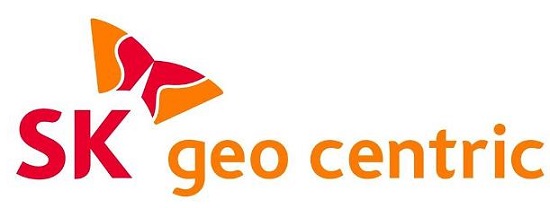
-Jinneng Science plans to launch a propane dehydrogenation unit and PP production in China in 2023
Chinese company Jinneng Science & Technology plans to launch a propane dehydrogenation (PDH) unit and polypropylene (PP) production facility in Qingdao in Shandong Province in the fourth quarter of 2023, the company said in a statement.
Line No. 2 includes a propane dehydrogenation unit with a capacity of 900 thousand tons per year and two polypropylene lines with a capacity of 450 thousand tons per year each.
“Construction has fully begun, and commissioning is scheduled for the fourth quarter of 2023,” the report said.
Line No. 1, which includes a propane dehydrogenation unit with a capacity of 900 thousand tons per year and the production of PP with a capacity of 450 thousand tons of polypropylene per year, was launched in mid-2021.
Earlier it was reported that Jinneng Science & Technology on May 30 resumed the production of polypropylene (PP) in Qingdao (Qingdao, Shandong Province, China) after scheduled repairs. This production with a capacity of 450 thousand tons of PP per year was closed on March 16. It was planned that the repairs would take about one month, but the resumption was postponed due to low production margins.
According to ScanPlast of Market Report, PP supplies to the Russian market by the end of 2021 amounted to 1,494.28 thousand tons (calculated according to the formula production + import – export), which is 21% more than a year earlier. Supplies of propylene homopolymer (PP-homo) and propylene block copolymer (PP block) increased. The supply of propylene stat copolymer (PP-random) has been significantly reduced.
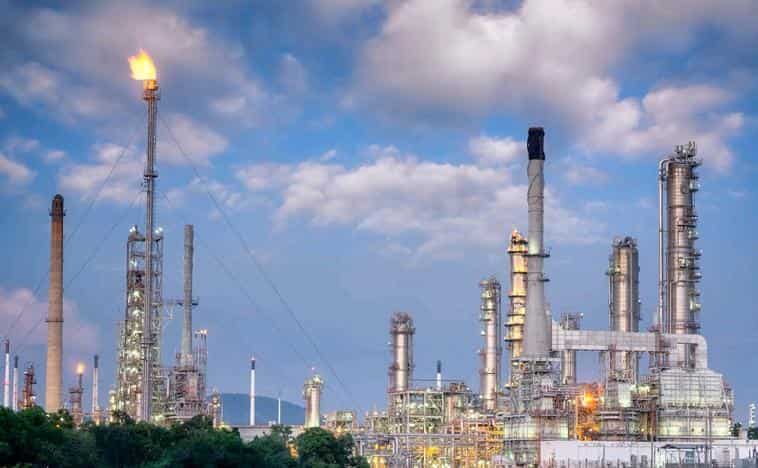
Lotte-rPET – Eco-packaging
